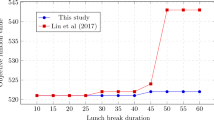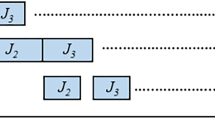Abstract
In time-dependent scheduling, various processing time functions are studied, yet absolute value functions have surprisingly been omitted from the discussion. Such a processing time function increases linearly with a job’s discrepancy from its ideal midtime. The objective is to find a schedule that minimizes the makespan, introducing the discrepancy time minimization problem. This single-machine scheduling problem with time-dependent processing times is motivated by optimization of walking times on a car assembly line. Its decision version is NP hard, as we show by reduction of the even–odd partition problem. For the variant with known start time, we develop several heuristics. Further insights form lower bounds and dominance rules for a branch-and-bound search. Numerical experiments show the performance of our algorithms on problem instances of up to 60 jobs. For the variant with common ideal midtime and flexible start time, we present a polynomial-time algorithm.













Similar content being viewed by others
References
Ahn, B. H., & Shin, J. Y. (1991). Vehicle-routeing with time windows and time-varying congestion. The Journal of the Operational Research Society, 42(5), 393–400.
Alidaee, B., & Womer, N. K. (1999). Scheduling with time dependent processing times: Review and extensions. The Journal of the Operational Research Society, 50(7), 711–720.
Andrés, C., Miralles, C., & Pastor, R. (2008). Balancing and scheduling tasks in assembly lines with sequence-dependent setup times. European Journal of Operational Research, 187(3), 1212–1223.
Bautista, J., & Pereira, J. (2007). Ant algorithms for a time and space constrained assembly line balancing problem. European Journal of Operational Research, 177(3), 2016–2032.
Biskup, D. (2008). A state-of-the-art review on scheduling with learning effects. European Journal of Operational Research, 188(2), 315–329.
Boysen, N., Fliedner, M., & Scholl, A. (2007). A classification of assembly line balancing problems. European Journal of Operational Research, 183(2), 674–693.
Boysen, N., Emde, S., Hoeck, M., & Kauderer, M. (2015). Part logistics in the automotive industry: Decision problems, literature review and research agenda. European Journal of Operational Research, 242(1), 107–120.
Browne, S., & Yechiali, U. (1990). Scheduling deteriorating jobs on a single processor. Operations Research, 38(3), 495–498.
Bukchin, Y., & Meller, R. D. (2005). A space allocation algorithm for assembly line components. IIE Transactions, 37(1), 51–61.
Bülbül, K., Kaminsky, P., & Yano, C. (2007). Preemption in single machine earliness/tardiness scheduling. Journal of Scheduling, 10(4–5), 271–292.
Cai, J. Y., Cai, P., & Zhu, Y. (1998). On a scheduling problem of time deteriorating jobs. Journal of Complexity, 14(2), 190–209.
Cheng, T. C. E., Ding, Q., Kovalyov, M. Y., Bachman, A., & Janiak, A. (2003). Scheduling jobs with piecewise linear decreasing processing times. Naval Research Logistics, 50(6), 531–554.
Cheng, T. C. E., Ding, Q., & Lin, B. M. T. (2004). A concise survey of scheduling with time-dependent processing times. European Journal of Operational Research, 152(1), 1–13.
Chica, M., Cordón, Ó., Damas, S., & Bautista, J. (2012). Multiobjective memetic algorithms for time and space assembly line balancing. Engineering Applications of Artificial Intelligence, 25(2), 254–273.
Du, J., & Leung, J. Y. T. (1990). Minimizing total tardiness on one machine is NP-hard. Mathematics of Operations Research, 15(3), 483–495.
Garey, M. R., Tarjan, R. E., & Wilfong, G. T. (1988). One-processor scheduling with symmetric earliness and tardiness penalties. Mathematics of Operations Research, 13(2), 330–348.
Gawiejnowicz, S. (2008). Time-dependent scheduling. Monographs in theoretical computer science. Berlin: Springer.
Hall, N. G., Kubiak, W., & Sethi, S. P. (1991). Earliness-tardiness scheduling problems, II: Deviation of completion times about a restrictive common due date. Operations Research, 39(5), 847–856.
Held, M., & Karp, R. M. (1962). A dynamic programming approach to sequencing problems. Journal of the Society for Industrial and Applied Mathematics, 10(1), 196–210.
Janiak, A., Krysiak, T., & Trela, R. (2011). Scheduling problems with learning and ageing effects: A survey. Decision Making in Manufacturing and Services, 5(1–2), 19–36.
Ji, M., & Cheng, T. C. E. (2007). An FPTAS for scheduling jobs with piecewise linear decreasing processing times to minimize makespan. Information Processing Letters, 102(2–3), 41–47.
Kacem, I. (2010). Fully polynomial time approximation scheme for the total weighted tardiness minimization with a common due date. Discrete Applied Mathematics, 158(9), 1035–1040.
Kanet, J. J. (1981). Minimizing the average deviation of job completion times about a common due date. Naval Research Logistics Quarterly, 28(4), 643–651.
Keha, A. B., Khowala, K., & Fowler, J. W. (2009). Mixed integer programming formulations for single machine scheduling problems. Computers and Industrial Engineering, 56(1), 357–367.
Kellerer, H., & Strusevich, V. A. (2006). A fully polynomial approximation scheme for the single machine weighted total tardiness problem with a common due date. Theoretical Computer Science, 369(1–3), 230–238.
Klampfl, E., Gusikhin, O., & Rossi, G. (2006). Optimization of workcell layouts in a mixed-model assembly line environment. International Journal of Flexible Manufacturing Systems, 17(4), 277–299.
Kononov, A. V. (1997). On schedules of a single machine jobs with processing times nonlinear in time. In A. D. Korshunov (Ed.), Operations research and discrete analysis, vol. 391 (pp. 109–122). Dordrecht: Springer.
Kovalyov, M. Y., & Kubiak, W. (1998). A fully polynomial approximation scheme for minimizing makespan of deteriorating jobs. Journal of Heuristics, 3(4), 287–297.
Kubiak, W., & van de Velde, S. L. (1998). Scheduling deteriorating jobs to minimize makespan. Naval Research Logistics, 45(5), 511–523.
Kunnathur, A. S., & Gupta, S. K. (1990). Minimizing the makespan with late start penalties added to processing times in a single facility scheduling problem. European Journal of Operational Research, 47(1), 56–64.
Lawler, E. L. (1977). A “pseudopolynomial” algorithm for sequencing jobs to minimize total tardiness. Annals of Discrete Mathematics, 1, 331–342.
Lawler, E. L., & Moore, J. M. (1969). A functional equation and its application to resource allocation and sequencing problems. Management Science, 16(1), 77–84.
Lee, C. Y., & Vairaktarakis, G. L. (1993). Complexity of single machine hierarchical scheduling: A survey. In P. M. Pardalos (Ed.), Complexity in numerical optimization (pp. 269–298). River Edge, NJ: World Scientific.
Malandraki, C., & Daskin, M. S. (1992). Time dependent vehicle routing problems: Formulations, properties and heuristic algorithms. Transportation Science, 26(3), 185–200.
Martino, L., & Pastor, R. (2010). Heuristic procedures for solving the general assembly line balancing problem with setups. International Journal of Production Research, 48(6), 1787–1804.
Picard, J. C., & Queyranne, M. (1978). The time-dependent traveling salesman problem and its application to the tardiness problem in one-machine scheduling. Operations Research, 26(1), 86–110.
Scholl, A., Boysen, N., & Fliedner, M. (2013). The assembly line balancing and scheduling problem with sequence-dependent setup times: Problem extension, model formulation and efficient heuristics. OR Spectrum, 35(1), 291–320.
Sourd, F. (2009). New exact algorithms for one-machine earliness-tardiness scheduling. INFORMS Journal on Computing, 21(1), 167–175.
Sourd, F., & Kedad-Sidhoum, S. (2008). A faster branch-and-bound algorithm for the earliness-tardiness scheduling problem. Journal of Scheduling, 11(1), 49–58.
Tanaka, S., Fujikuma, S., & Araki, M. (2009). An exact algorithm for single-machine scheduling without machine idle time. Journal of Scheduling, 12(6), 575–593.
Wan, L., & Yuan, J. (2013). Single-machine scheduling to minimize the total earliness and tardiness is strongly NP-hard. Operations Research Letters, 41(4), 363–365.
Wu, C. C., Shiau, Y. R., Lee, L. H., & Lee, W. C. (2009). Scheduling deteriorating jobs to minimize the makespan on a single machine. The International Journal of Advanced Manufacturing Technology, 44(11–12), 1230–1236.
Author information
Authors and Affiliations
Corresponding author
Rights and permissions
About this article
Cite this article
Jaehn, F., Sedding, H.A. Scheduling with time-dependent discrepancy times. J Sched 19, 737–757 (2016). https://doi.org/10.1007/s10951-016-0472-2
Published:
Issue Date:
DOI: https://doi.org/10.1007/s10951-016-0472-2




